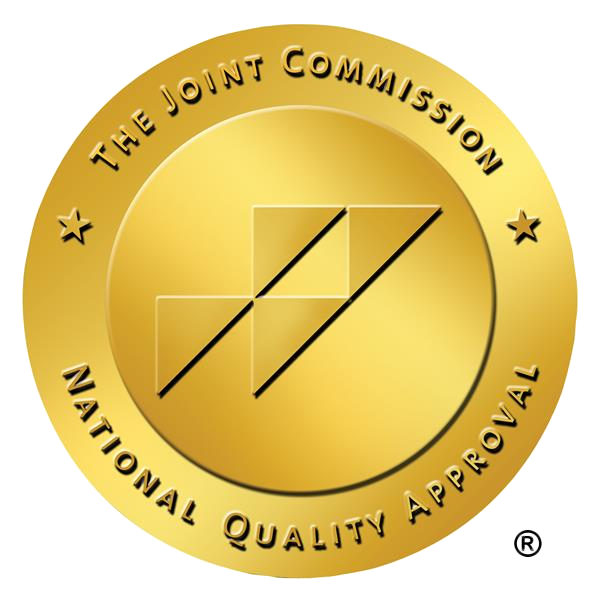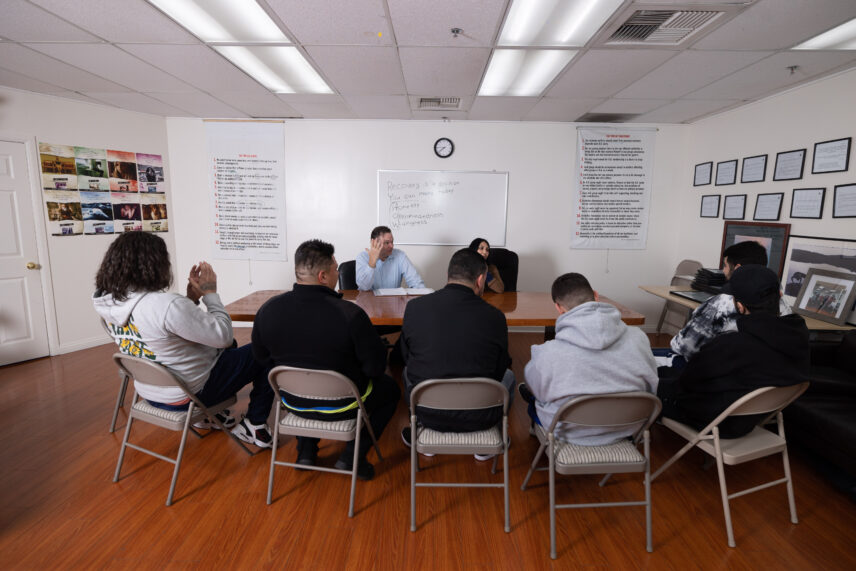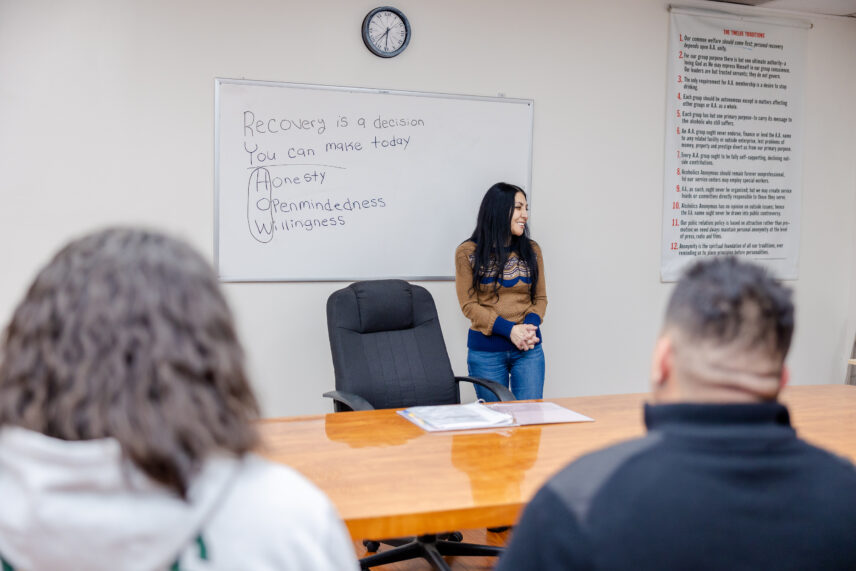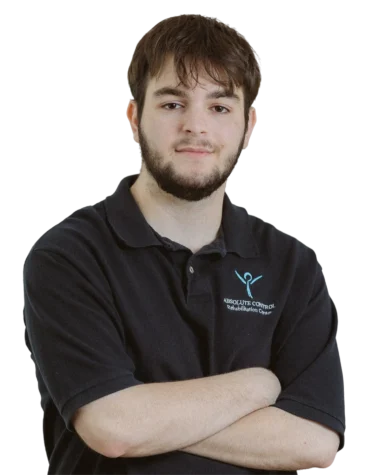Programs
Our team of experienced professionals, many of whom have overcome addiction themselves, offers confidential and individualized therapies to meet our patients' physical, emotional, and mental needs.
Why Entrust Your Treatment Journey to Absolute Control Treatment Center?
- We know what addiction is and can feel your pain
- We have over 20 years of addiction treatment experience
- We offer a fellowship program for continuous impact
- We adopt evidence-based methods in our treatment plans
About Us
Founded in 2003, Absolute Control Treatment Center brings over 20 years of collective experience in addiction treatment. We provide not only treatment but also foster a sense of community. Our programs are ongoing, and we remain committed to supporting patients beyond treatment with evidence-based practices and treatment plans tailored to each individual’s unique needs.
At Absolute Control Treatment Center, our approach to addiction treatment is holistic, taking into account not just the physical symptoms of addiction but also the underlying psychological and emotional factors. That’s why we have developed fellowship programs for our patients, ensuring continuous support throughout their recovery journey.
Meet Our Treatment Team
Our compassionate and experienced specialists are dedicated to helping you achieve lasting recovery. With addiction medicine physicians, licensed therapists, registered nurses, and other professionals on our team, we provide evidence-based, holistic care that addresses underlying issues
Co-occurring Disorders
What is Co-occurring Disorder?
Co-occurring disorders, also called dual diagnosis, happen when a person has two or more different conditions at the same time. Specifically, in mental health, it means having a mental health problem alongside a substance use problem.
Co-occurring disorders can include various mental health issues like anxiety, depression, bipolar disorder, schizophrenia, and others. Dealing with co-occurring disorders can be challenging, as the symptoms of each condition may overlap or worsen each other.
Effective treatment involves simultaneously addressing the mental health issue and substance use problem. This usually means a combination of therapy, medication, support groups, and making positive changes in one’s lifestyle.
What is Anxiety?
Anxiety is a feeling of worry and fear about future events, uncertainties, or potential dangers. When a person feels anxious, their body might respond by increasing heart rate, breathing faster, and experiencing sweaty palms. Some people may also have racing thoughts or find it challenging to concentrate.
Anxiety can be triggered by various situations, such as giving a presentation, going on a first date, or facing a difficult situation. While a certain level of anxiety is normal, excessive and persistent anxiety that interferes with daily life may indicate an anxiety disorder. It is important to seek reliable anxiety counseling services if anxiety becomes overwhelming or starts to impact a person’s ability to function normally.
What is Bipolar?
Bipolar disorder, or manic-depressive disorder, is a mental disorder that affects a person’s mood. Bipolar patients experience extreme shifts in their emotions, ranging from periods of intense excitement and elevated mood, known as manic or hypomania, to episodes of deep sadness and hopelessness, known as depression.
During manic, a patient may engage in impulsive and risky behaviors, have a decreased need for sleep, talk excessively, and exhibit a grandiose sense of self-importance. During depression, on the other hand, patients have a persistent low mood, loss of interest in activities previously enjoyed, changes in sleep patterns and appetite, difficulty focusing, and feelings of worthlessness or guilt.
Seeking professional help is crucial in managing and stabilizing the condition. Bipolar disorder treatment programs usually involve a combination of medication, therapy, and lifestyle adjustments.
What is Depression?
Depression is a common mental disorder that impacts a person’s emotions, thoughts, and behaviors. Individuals with depression often experience a loss of interest in activities they once enjoyed and may struggle with sleep problems, such as insomnia or excessive sleeping. Other symptoms of depression are changes in appetite, low energy levels, and difficulties with concentration.
Depression can stem from various factors, including genetic predisposition, chemical imbalances in the brain, hormonal changes, and stressful life events like trauma, loss, or relationship issues. As for depression, treatment programs often include a combination of therapy, medication, and support from loved ones. It can also include a dual diagnosis of depression help in case of substance use disorder accompanying depression.
What is OCD?
Obsessive-Compulsive Disorder is a mental and behavioral condition that affects people of all age groups. Individuals with OCD often experience intense anxiety and distress due to their obsessions, which can revolve around cleanliness, symmetry, harm, or even forbidden thoughts. They cope with these negative ideas by engaging in compulsive behaviors such as excessive handwashing, checking, counting, or arranging things in a specific order. However, the effect of these behaviors is temporary and does not provide lasting relief.
This disorder is not simply a personality quirk or a preference for cleanliness or any other obsession. Rather, it is an obsessive-compulsive disorder that significantly impacts a person’s quality of life. However, by participating in OCD treatment programs, individuals can regain control over their lives and find lasting relief from the distress caused by OCD.
What is PTSD?
PTSD stands for Post-Traumatic Stress Disorder. It is a mental health condition that can develop when a person goes through a traumatic event. Such unpleasant events include accidents, natural disasters, physical or sexual assault, combat experiences, or witnessing a violent event.
PTSD can have a significant influence on a person’s daily life, relationships, and overall well-being. So, if you or someone
you know is struggling with symptoms of PTSD, it is essential to seek help and support from a mental health specialist and seek an effective PTSD rehab that can provide guidance, therapy, and appropriate treatment options to help manage the condition.
Definition of PTSD
PTSD is a psychiatric condition that evolves after exposure to a traumatic event. People with PTSD often experience intrusive and distressing memories, nightmares, and flashbacks related to the traumatic event.
They may also exhibit avoidance behaviors, have negative changes in mood and cognition, and display heightened arousal and reactivity. The condition can significantly impair an individual’s daily functioning, relationships, and overall quality of life.
Addictions We Treat
We understand how difficult it can be to break free from the cycle of addiction, but we also know that recovery is possible.
About quiz
If you suspect that you or a loved one may be struggling with addiction, taking a self-assessment quiz can be an excellent first step in determining the extent of the issue.
Alcohol Addiction Test
Our Alcohol Addiction Test consists of simple questions to assess your drinking habits and the potential impact of alcohol on your life. The test takes just a few minutes to complete and provides instant feedback on your risk level for alcohol addiction.
Substance Addiction Test
Our Substance Addiction Test is a quick and confidential way to evaluate your substance use and identify any signs of addiction. The test includes questions about your drug use, as well as the impact of drug use on your relationships, work, and overall quality of life.

Contact us for any medical help and fill out an appointment form
INSURANCE
At Absolute Control Treatment Center, we understand that the cost of addiction treatment can be a barrier for many individuals. That's why we work with major private and PPO health insurance providers to help cover the cost of our programs.
We offer various payment options, including self-pay, to help make our programs more accessible to those without insurance coverage.

We Are Accredited by Joint Commission
Absolute Control’s accreditation from The Joint Commission makes it clear to the public and within the treatment field that our programs meet the highest standards for quality healthcare. Learn more about why this is important.
Answers to Your Questions About Addiction, Treatment, and Recovery
Learn what to expect during the admissions process, how to prepare for treatment, and what teens will experience during their time with us. Our FAQs also cover insurance questions and information for referring providers.
We understand how difficult it can be to break free from the cycle of addiction, but we also know that recovery is possible.
Our Clients Testimonials
Blog
Discover new insights, gain inspiration, and find helpful information on addiction, treatment, and navigating life in recovery. Our blog features expert advice, personal stories, and the latest research to help you or your loved one on the journey to recovery.








